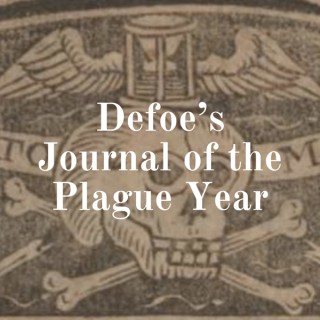Defoe's Journal of the Plague Year
Follow Defoe's Journal of the Plague YearA reading of Daniel Defoe's 1722 A Journal of the Plague Year, about 20 minutes at a time.
- Apr 19, 2020 LATEST EPISODE
- infrequent NEW EPISODES
- 20m AVG DURATION
- 23 EPISODES
Latest episodes from Defoe's Journal of the Plague Year

H.F. tells of the plague's end, but notes the disappointing fact that the people's thankfulness didn't last, nor their sense of common purpose and identity across social and sectarian lines.

H.F. notes that, in about the middle of October, the plague's virulence seemed to abate—though many continued to be infected and many continued to die, yet more of the infected recovered than had previously been the case. Seeing this, many Londoners made premature returns to their normal patterns of life, causing many to succumb in the Autumn who had survived the worst of the Summer.

H.F. surveys the plague's effects on foreign and domestic trade, as well as on English manufacturing.

H.F. offers an hypothesis for some seeming incongruities in the numbers of of plague deaths reported in the Bills of Mortality before turning to the effects of the epidemic on the poor, and the tremendous scale of charitable giving that sustained them through the worst of it.

H.F. argues that, while the Plague may be a general judgment of God upon a nation or city, yet it operates by natural, rather than supernatural causes. He observes that its spread was impossible to contain, given that people could infect others before they, themselves, knew that they were infected.

H.F. details the movement of infections from West to East, culminating in the City's bearing the brunt of the Plague in September. He reiterates the good governance of London and Westminster during the emergency.

H.F. comes to the month of September, when the plague was at its height, and notes a kind of equanimity born of Londoners' despair and resignation.

H.F. explains his reservations about the practice of shutting up houses while both sick and well people stayed in them, and grounds them in his observations during the period when he was enlisted as an Examiner of houses in his parish.

H.F. examines the reputed desire of infected people to infect others, and considers how it is that so many infected people could wander the streets at a time when houses were being shut up.

H. F. completes the story of the three laborers and their company, who weathered the plague in an encampment in Epping Forest.

H.F. continues the story of the three poor laborers, who are joined by another company of refugees and bluff their way past a constable at Walthamstow.

H.F. turns to the story of three poor laborers—a biscuit baker, a sail maker, and a joiner—who resolve to take to the road rather than stay in London.

H.F. turns from the circumstances of maritime tradesmen and their families to the plague's toll among pregnant women, nursing mothers, and infant children.

H.F.'s curiosity causes him to venture to the Thames to see how things fare on the river. He meets a poor waterman working to support his quarantined family and is moved by his story.

H.F. notes the many varieties of working people left without work by the cessation of business and commerce, as well as the response by public authorities to relieve them.

H.F. describes the variety of crimes—from petty theft to murder—reputed to have been committed during the emergency, and offers a humorous story of the poor piper who was nearly buried alive.

H.F. notes that few had sufficient provisions to sustain their households for any length of time, and were compelled to venture out regularly for food, medicine, and other necessaries.

H.F. recounts the horrors of the mass graves in Aldgate Churchyard, and the shocking behavior of a set of men who mocked the people's grief and terror.

H.F. recounts the responses of people confined to their houses, including the subterfuges some took to escape. He tells of the particularly affecting case of a woman driven out of her senses by grief.

H.F. reviews (and reproduces the text of) the public orders given for quarantining and monitoring those suspected of infection.

H.F. reflects on the religious sentiments awakened by the plague, but also on the prevalence of charlatans and quacks willing to exploit the fears of the poor, in particular.

H.F. resolves to stay in London and describes the popular superstitions of the frightened Londoners.

H. F. notes the early signs of the arrival of plague near the end of 1664, and must consider whether to stay in London or whether to leave the city.








